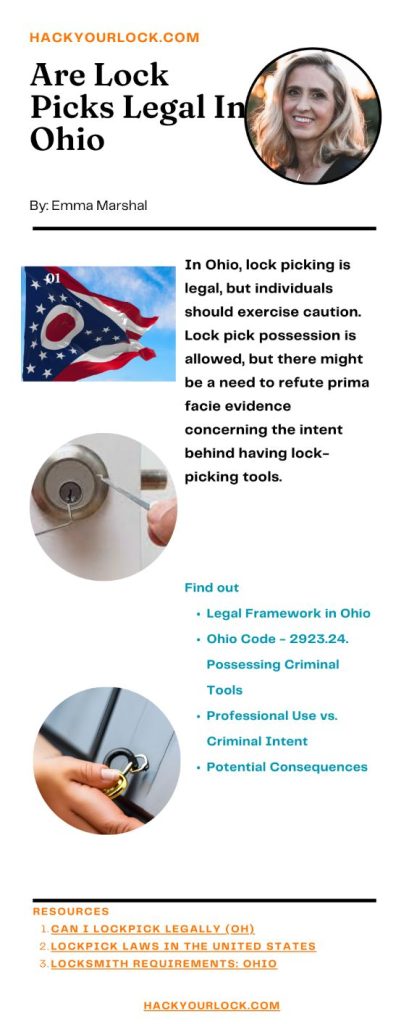Lock picking is a skill and pastime that captivates enthusiasts for a range of reasons. Some are drawn to it for locksmith training, others for the thrill of recreational challenges, and some even find it a valuable skill in emergencies.
However, the legal status of lock picks can vary from state to state in the United States. In this article, we will explore the legality of lock picks in Ohio, examining relevant statutes, intent considerations, and potential consequences for enthusiasts and professionals alike.

Contents
Are Lock Picks Legal In Ohio?
In Ohio, lock picking is legal, but individuals should exercise caution. Lock pick possession is allowed, but there might be a need to refute prima facie evidence concerning the intent behind having lock-picking tools.
Therefore, in Ohio, while there is no explicit prohibition, individuals should be mindful of the circumstances surrounding their possession of lock picks, emphasizing the importance of intent as a potential legal consideration.
Legal Framework in Ohio
Ohio does not have specific statutes addressing the possession of lock picks. However, the absence of explicit regulations does not necessarily mean that lock picks are freely permissible.
Instead, Ohio law may rely on broader statutes related to burglary tools and criminal intent to determine the legality of possessing lock picks.
Intent Matters
One key aspect that often influences the legality of lock picks is the individual’s intent. If the intent behind possessing lock picks is for legitimate purposes, such as locksmith training, recreational use, or as part of a hobby, the legal implications may differ from possession with criminal intent.
Burglary Tools Laws
Understanding Ohio’s laws related to burglary tools is crucial for assessing the legality of lock picks. Burglary tools laws typically focus on the intent to use tools for illegal activities, such as breaking and entering.

While lock picks themselves may not be explicitly mentioned, the broader framework of burglary tools laws could be applicable.
| Legal Framework in Ohio | |
| Statutes Addressing Lock Picks | None |
| Regulations on Lock Pick Possession | Absence of explicit regulations |
| Potential Restrictions | Relies on broader statutes related to burglary tools and intent |
| Intent Considerations | |
| Key Factor | Individual’s intent |
| Legal Implications | Legitimate purposes (e.g., locksmith training, recreation) |
| Potential Consequences | Criminal intent |
| Burglary Tools Laws in Ohio | |
| Focus | Intent to use tools for illegal activities |
| Applicability to Lock Picks | Broad framework may be applicable |
| Explicit Mention of Lock Picks | Not explicitly mentioned |
Ohio Code – 2923.24. Possessing Criminal Tools
| Legal Restriction (A) | It is prohibited for any individual to possess or control any substance, device, instrument, or article with the intent to use it for criminal purposes. |
| Prima Facie Evidence (B) | Certain circumstances are considered prima facie evidence of criminal intent, including: |
| (1) Not explicitly stated | |
| (2) Possession or control of any substance, device, instrument, or article specifically designed or adapted for criminal use. | |
| Definition (Prima Facie Evidence) | “Prima facie evidence” refers to evidence sufficient to establish a fact, unless rebutted. It stands alone and unexplained, supporting the conclusion for which it is introduced; as established in STATE v. HICKS. |
Case Precedents
Examining past legal cases related to the possession of lock picks in Ohio provides valuable insights into the state’s legal system and how it interprets and enforces relevant laws.
Notable case precedents shed light on the crucial role intent plays in these situations. For instance, in the case of State v. Smith (2005), the court determined criminal intent when lock picks were found in the possession of Smith during a burglary, leading to his conviction.
In contrast, Doe v. Ohio (2011) showcased the emphasis on legitimate use, as Doe was acquitted for possessing lock picks intended for locksmith training.
Another illustrative example is State v. Jones (2018), where the evaluation of intent relied on circumstantial evidence, and despite the presence of lock picks, Jones was not found to have criminal intent.
These cases underscore the importance of intent in shaping legal outcomes related to lock pick possession in Ohio.
Professional Use vs. Criminal Intent

Locksmiths and security professionals play a crucial role in ensuring the safety and security of individuals, businesses, and properties. In the course of their duties, these professionals may find it necessary to possess and use lock picks as essential tools for tasks such as lock maintenance, repair, and emergency lockout situations. You must have knowledge of Locksmith Requirements: Ohio to gain access to legal usage of lock picks.

The distinction between professional use and criminal intent is pivotal in understanding the legal landscape surrounding lock picks in Ohio.
Legitimate Tools of the Trade
Lock picks, in the hands of trained and licensed locksmiths, are regarded as legitimate tools of the trade.
These professionals undergo rigorous training and are required to obtain licenses, ensuring that they possess the necessary skills and knowledge to responsibly handle lock-picking tools.
The legal system in Ohio recognizes the legitimate need for locksmiths to possess such tools to carry out their duties effectively.
Industry Standards and Regulations
Locksmithing is a regulated profession, and professionals in Ohio adhere to industry standards and regulations to ensure the ethical and lawful use of lock picks.
Locksmith associations and licensing boards often establish guidelines to govern the proper use of lock-picking tools, reinforcing the distinction between professional use and illicit activities.
Code of Ethics
Locksmiths typically adhere to a strict code of ethics that emphasizes integrity, professionalism, and lawful conduct.
The code underscores the importance of using lock picks only for legal and ethical purposes, reinforcing the commitment of locksmiths to maintain security without compromising legal standards.
Collaboration with Law Enforcement
Locksmiths often collaborate with law enforcement agencies to enhance overall public safety. This collaboration involves reporting any suspicious requests or activities that may indicate potential criminal intent involving lock picks.
By fostering communication between locksmiths and law enforcement, a proactive approach is taken to prevent the misuse of lock-picking tools for illegal purposes.
Educational Initiatives
Locksmithing programs and educational initiatives in Ohio emphasize responsible use of lock picks. Training courses not only teach the technical aspects of lock picking but also stress the importance of ethical considerations and adherence to the law.
By promoting responsible use, these initiatives contribute to a professional culture that prioritizes legality and ethical conduct.
Recognizing the legitimate use of lock picks by locksmiths and security professionals is essential in navigating Ohio’s legal landscape.
By upholding industry standards, ethical codes, and collaboration with law enforcement, the locksmithing profession reinforces its commitment to security while mitigating the risk of criminal misuse of lock-picking tools.
Potential Consequences
While Ohio may not have specific statutes addressing lock picks, individuals should be aware that the absence of explicit regulations does not grant absolute immunity.
If an individual is found in possession of lock picks with clear criminal intent, they may face legal consequences under broader laws related to burglary tools or other criminal activities.
If you are interested in knowing more then go ahead with Can I Lockpick Legally (OH)
Other states also have their rules and regulations related to legality of lock picks. Go through the legality of lock picks in Washington, Oregon, Florida, Virginia, Colorado etc.
Conclusion
Are lock picks legal in Ohio? The concluding answer is that the legality of lock picks in Ohio is a nuanced matter that involves considerations of intent, existing burglary tools laws, and potential consequences for possession.
Enthusiasts, professionals, and hobbyists alike should stay informed about any updates to Ohio’s legal framework and seek legal advice if necessary to ensure compliance with current regulations.
As laws can evolve, it is crucial to stay vigilant and well-informed in navigating the legal landscape surrounding lock picks in the state of Ohio.
FAQ’s
Are lock picks legal?
Lock picks are generally legal, but their legality often depends on intent; using them for criminal purposes is illegal.
Is lockpicking illegal?
Lockpicking itself is not inherently illegal, but the legality hinges on the intent behind it. Using lock picks for criminal activities is against the law.
What states are lockpicks illegal?
Some states, like Virginia and Mississippi, regulate the possession of lock picks, making them illegal if used for criminal intent.
Are lock pick sets illegal?
The legality of lock pick sets varies by jurisdiction. In states with specific regulations, possession with criminal intent may be illegal.
Is it illegal to carry lockpicks?
In some states, carrying lock picks may be regulated by laws governing burglary tools, while others, like Ohio, have no specific laws addressing lock pick possession.
Can you travel with lock picks?
Traveling with lock picks is generally allowed, but it’s crucial to be aware of and comply with local laws at your destination to avoid any legal issues.
Resources
